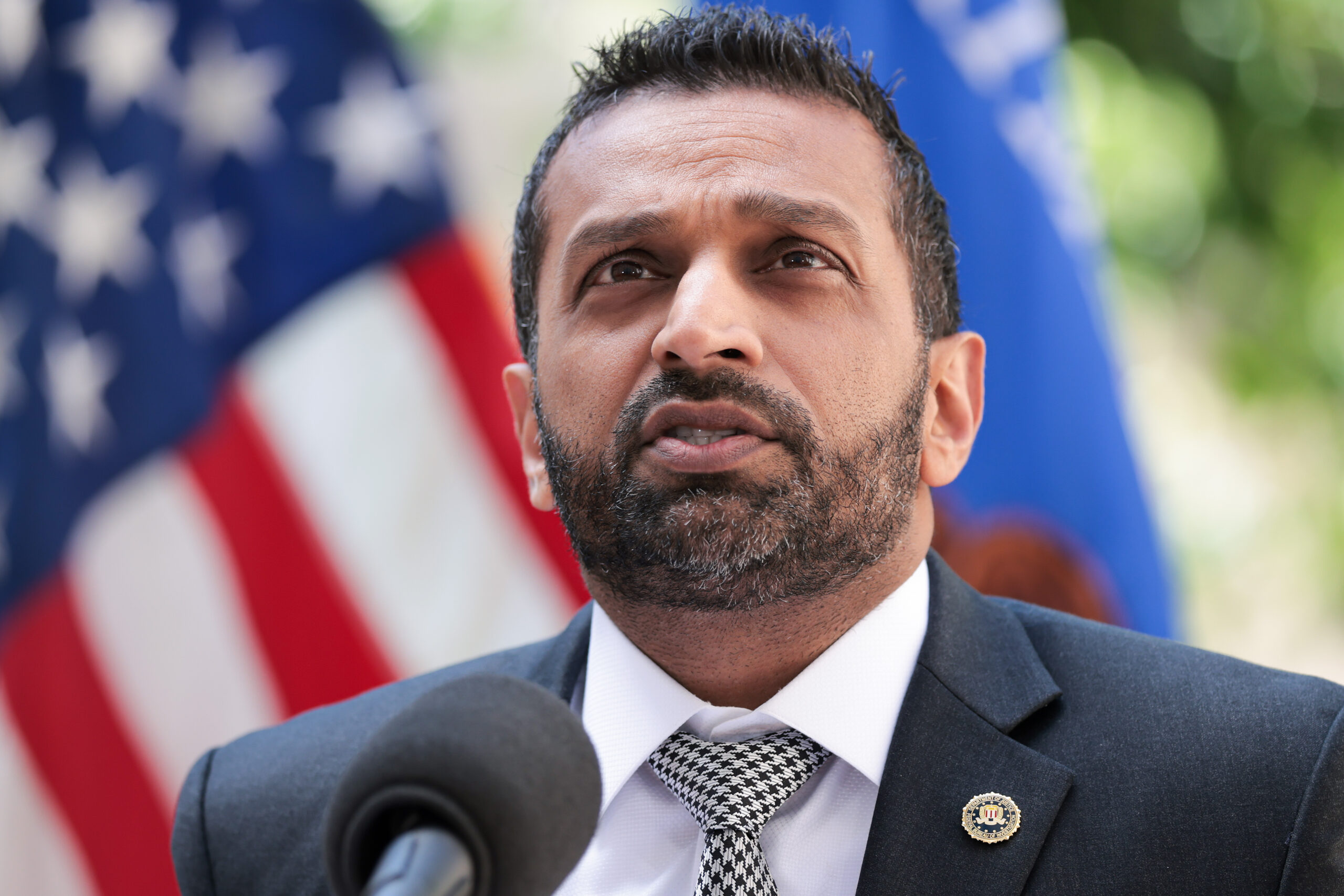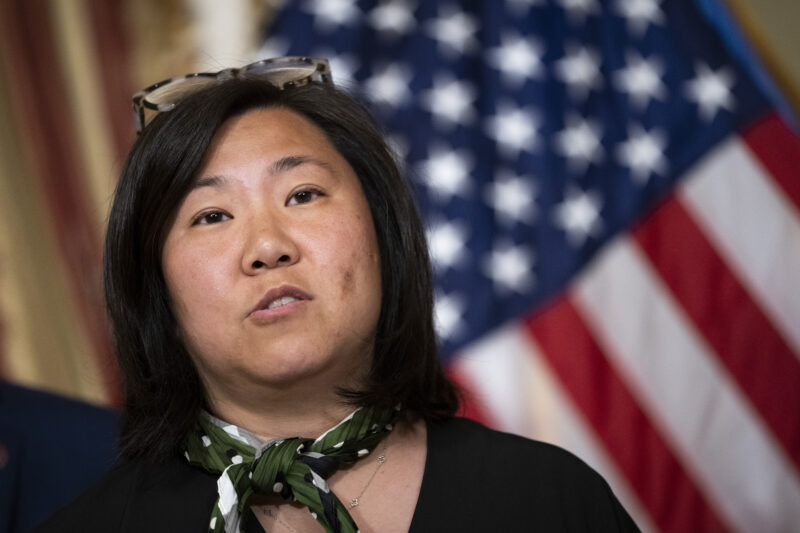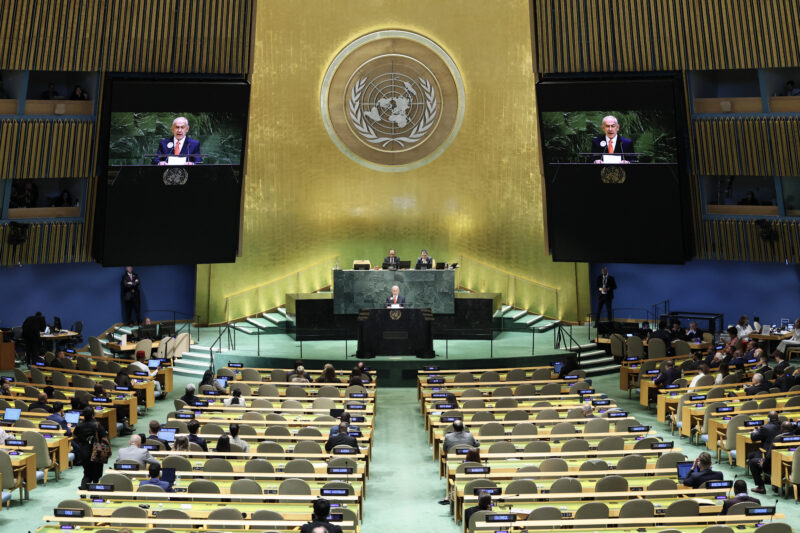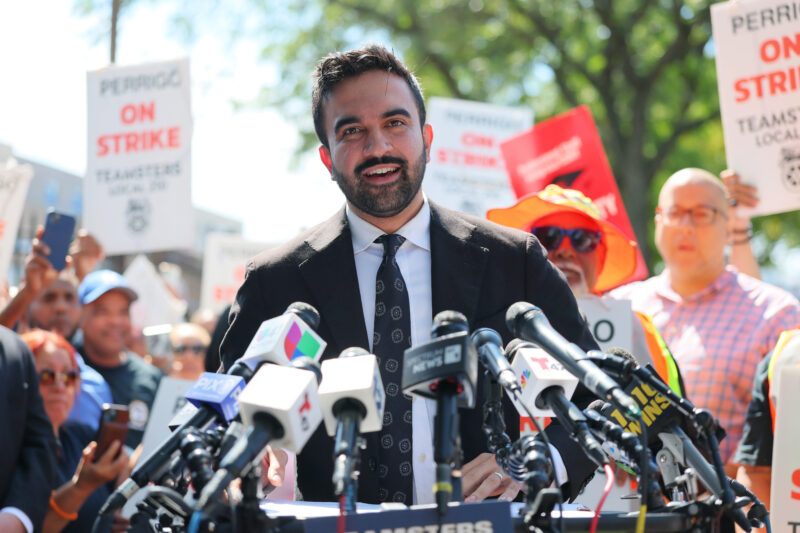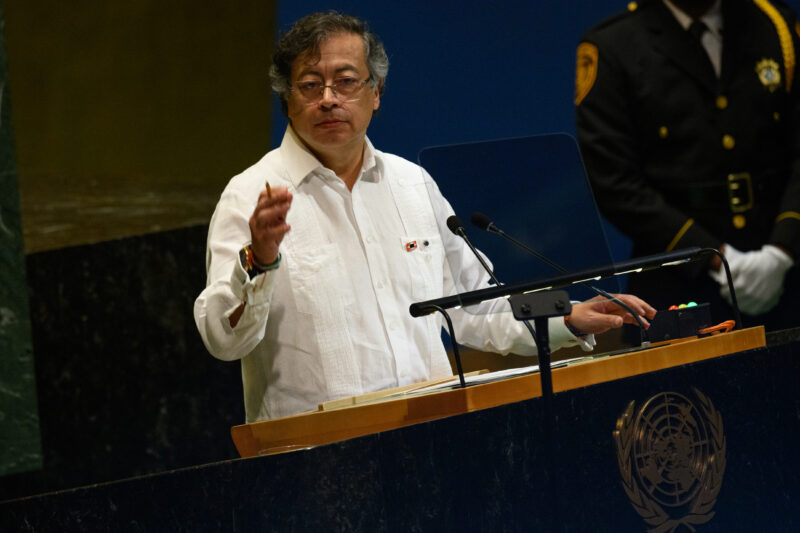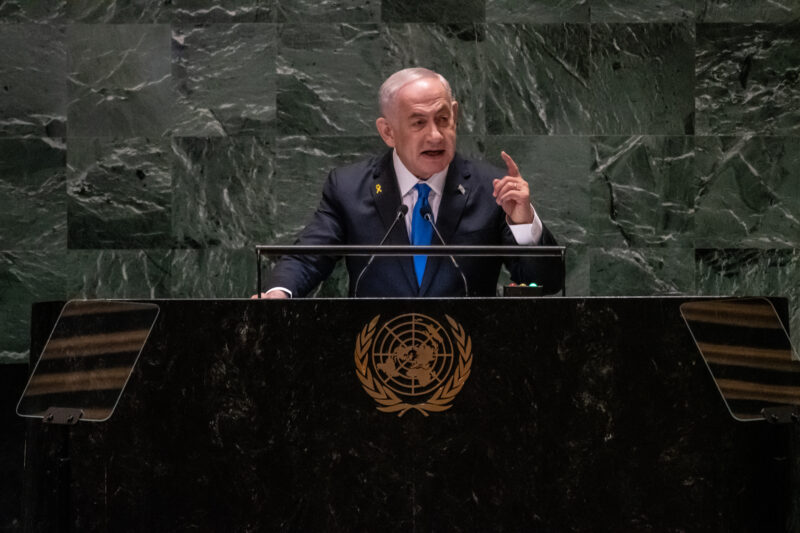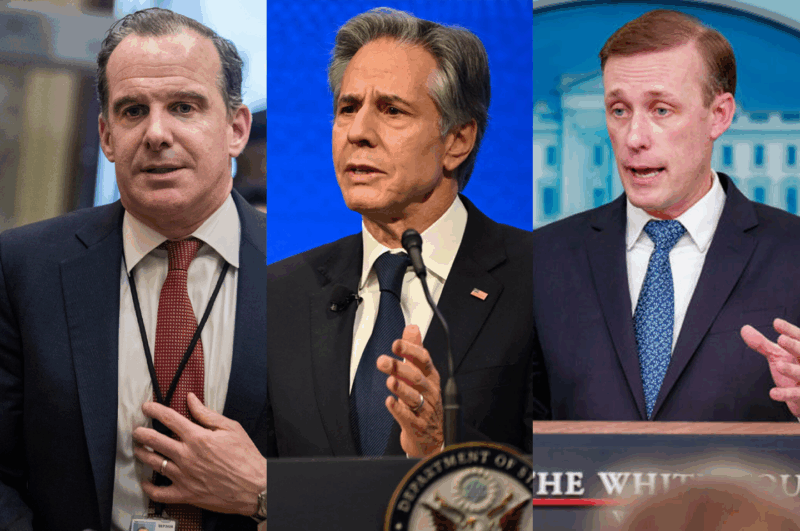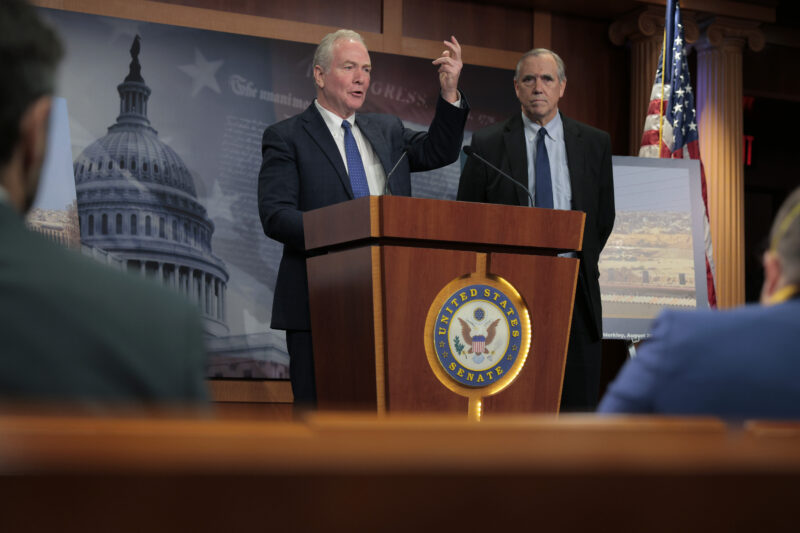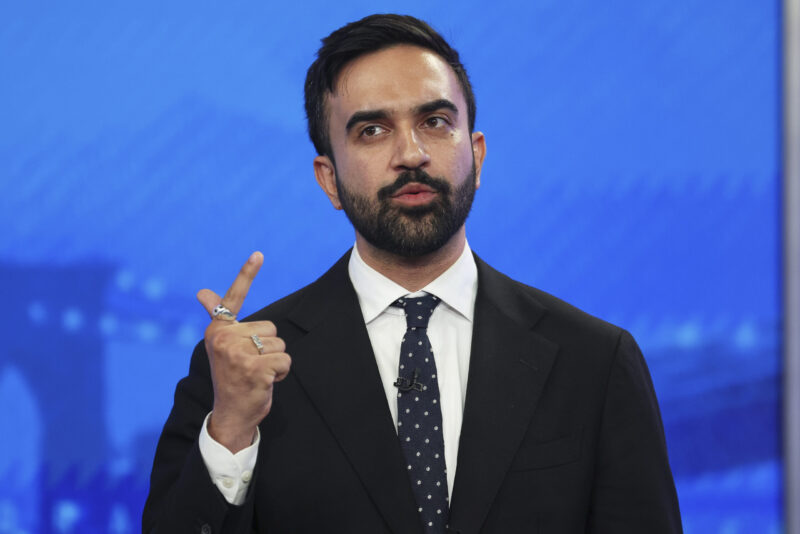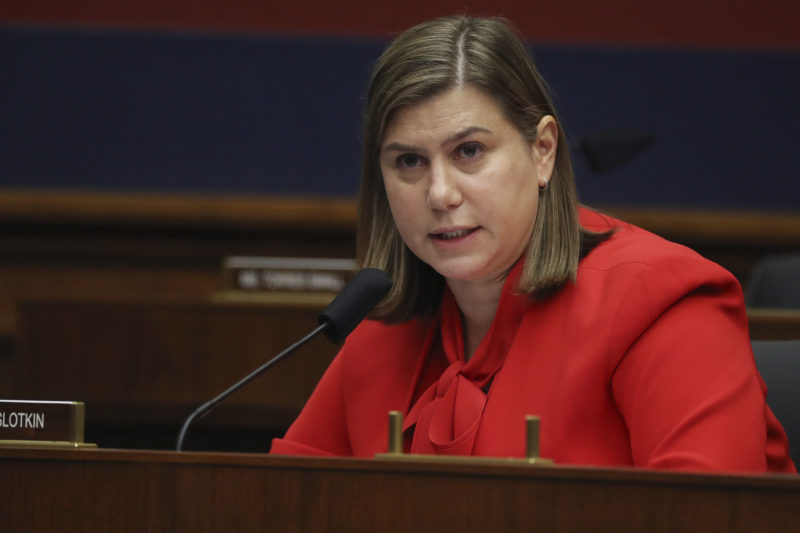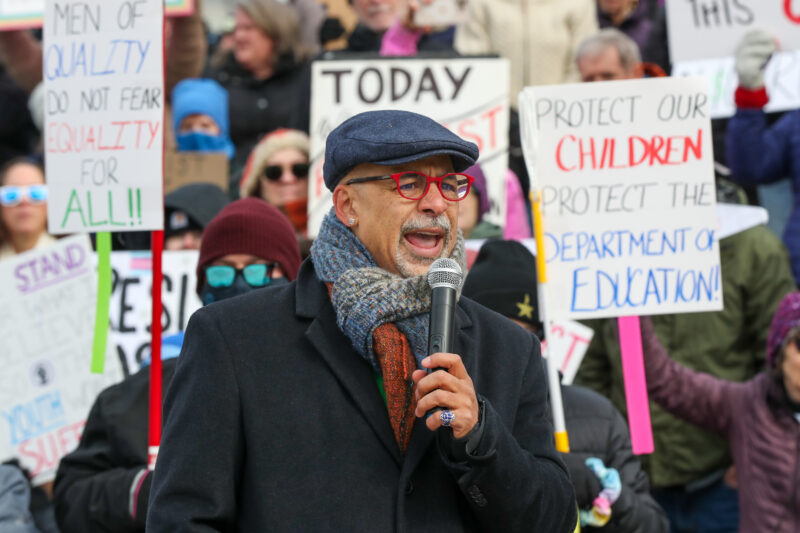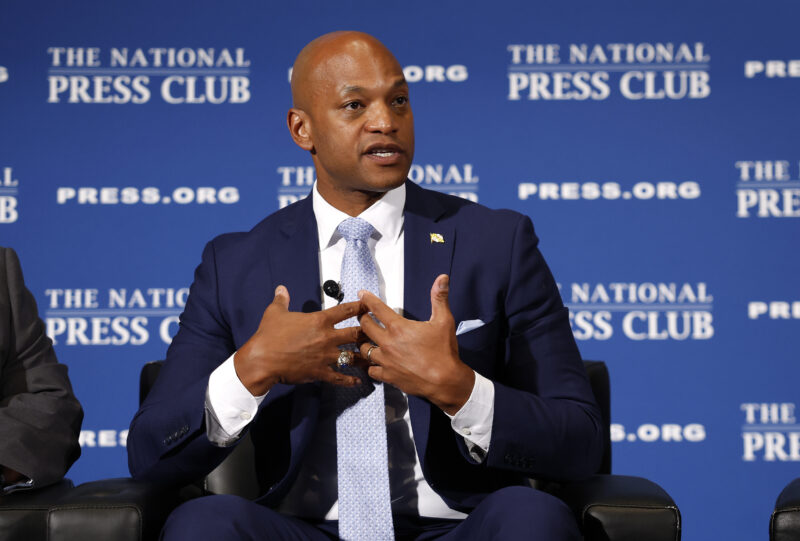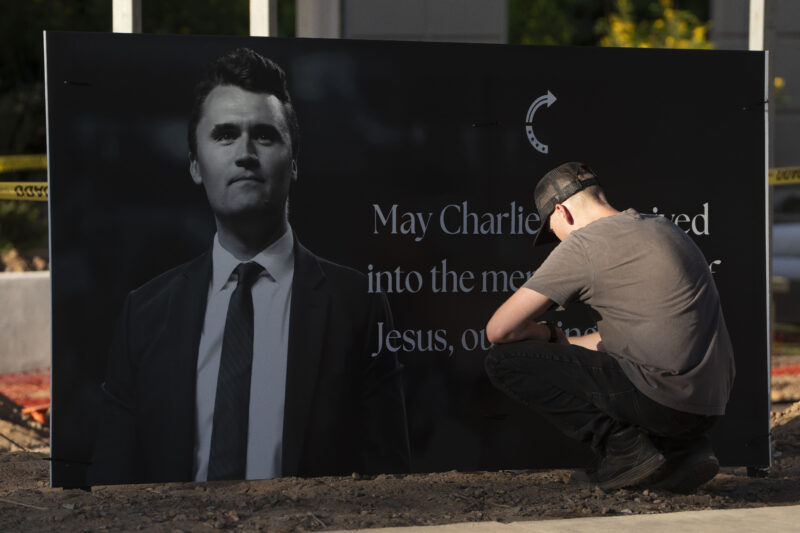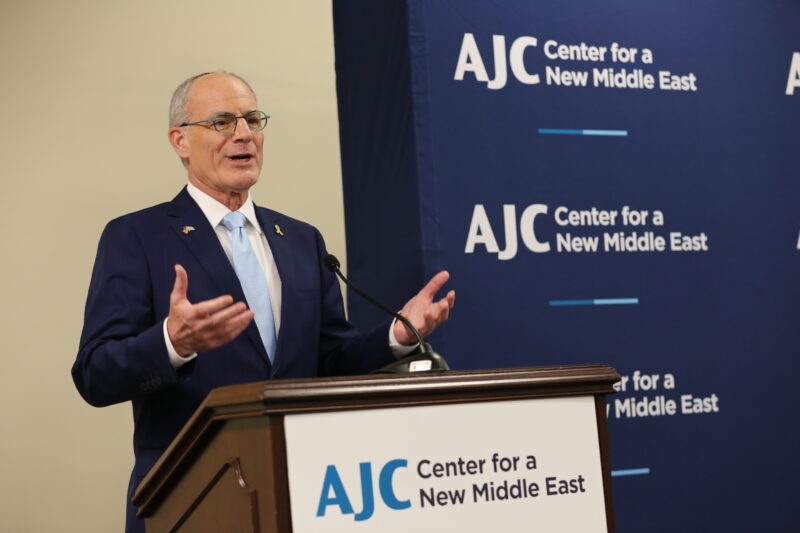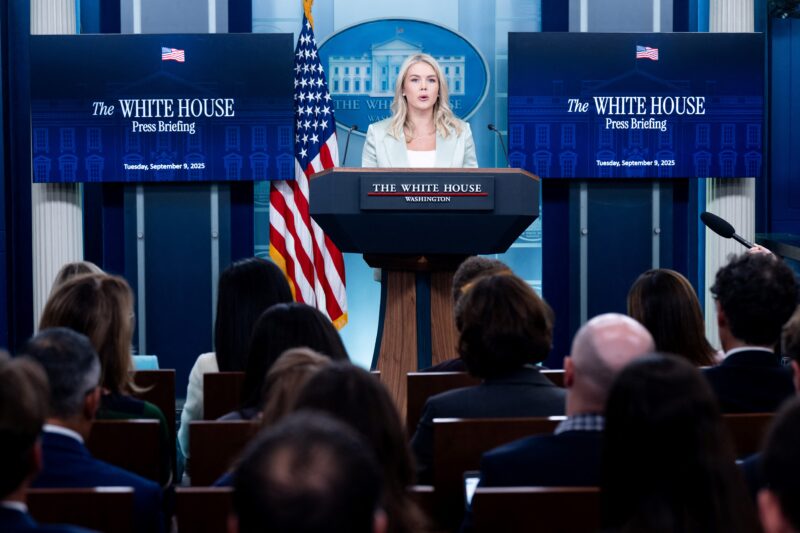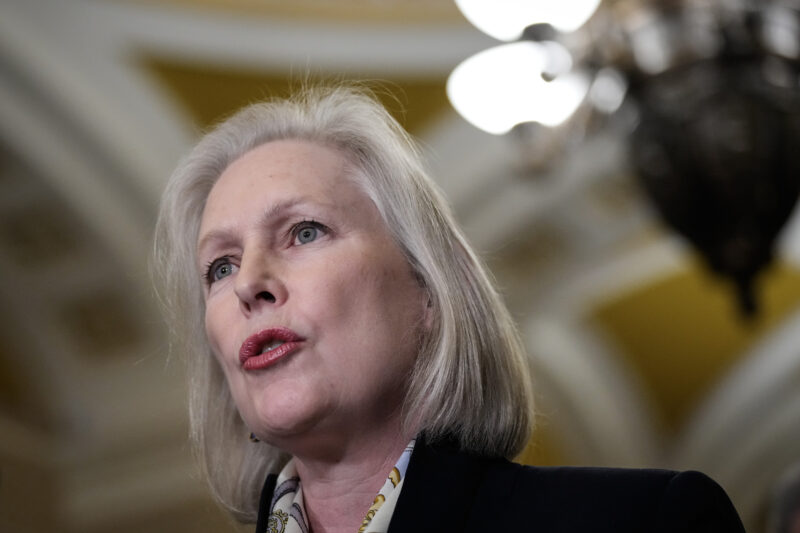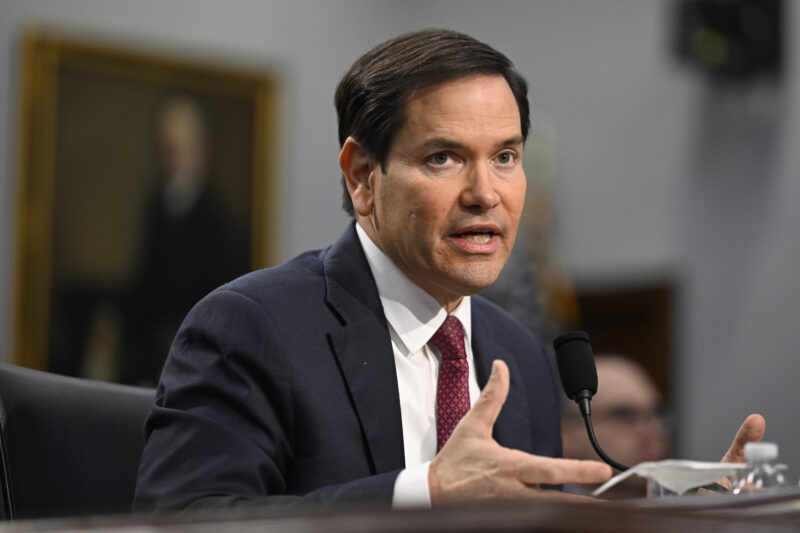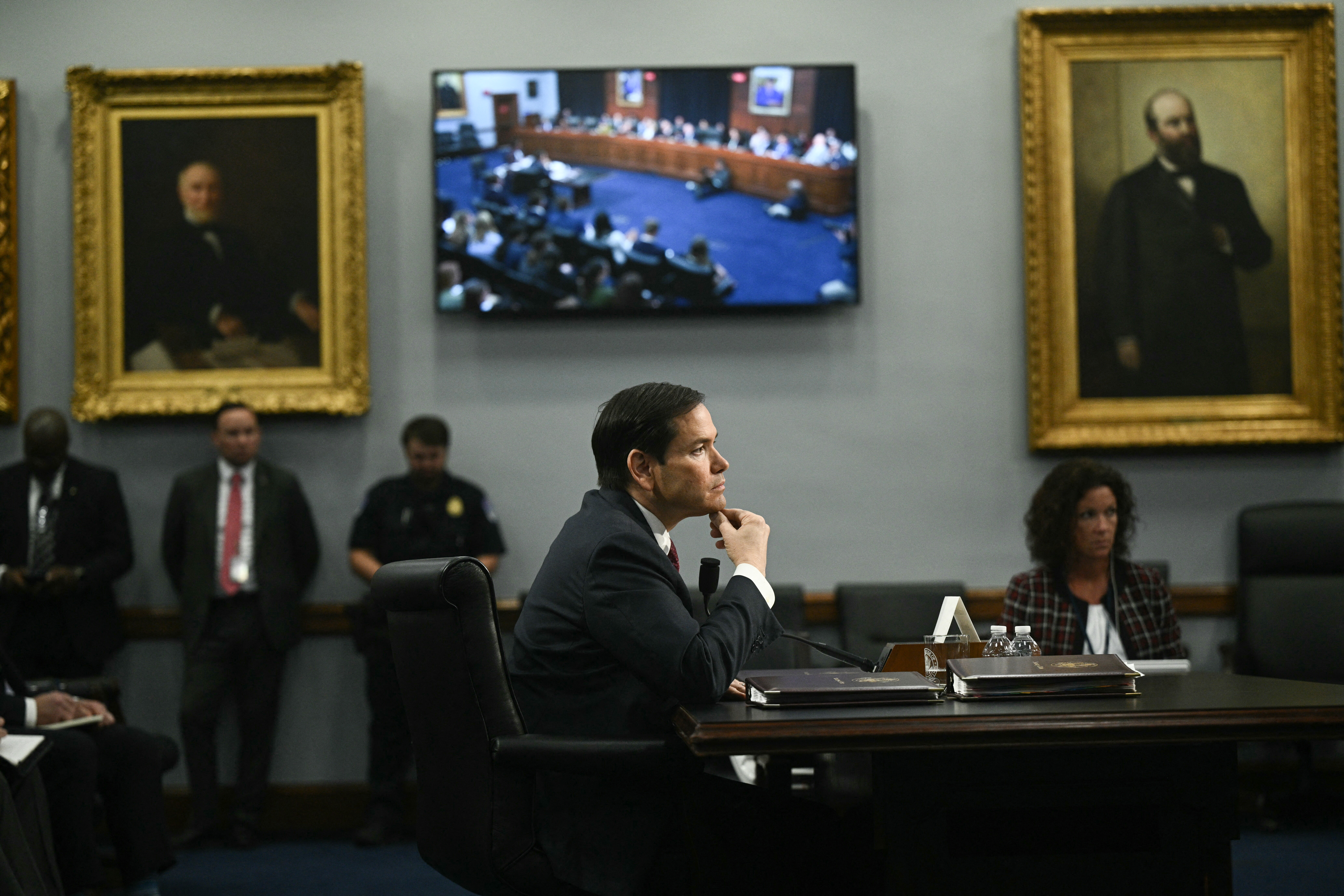At the same time, the legislation cuts funding for the Department of Education’s Office for Civil Rights by nearly $50 million

David Ake/Getty Images
U.S. Department of Education headquarters building in Washington, DC.
The House Appropriations Committee’s proposed funding bill for the Department of Education includes sweeping new provisions cutting off funding for colleges and universities that fail to address campus antisemitism, but would also cut $49 million in funding for the Department of Education’s Office for Civil Rights in 2026.
New language included in the bill states that no federal funding may be provided to institutions of higher education “unless and until such institution adopts a prohibition on antisemitic conduct that creates a hostile environment in violation of Title VI of the Civil Rights Act of 1964 in all documents relating to student or employee conduct.”
The bill also bans funding to schools that have “failed to take administrative action against any student, staff member, or student group that commits acts of antisemitism while utilizing the facilities, grounds, or resources of such institution.”
The former provision would require schools to specifically implement anti-discrimination policies regarding antisemitism as a precondition of federal funding, while the latter could give the Department of Education additional latitude to cut funding to schools that have allowed antisemitic conduct to go unaddressed or unpunished.
At the same time, the bill would provide $91 million in funding for the Office for Civil Rights, down from $140 million provided in several previous years. The Trump administration, in its budget request to Congress, requested the same cut, as it looks to slash the size of the Department of Education while winding down the department.
The Appropriations Committee’s subcommittee on Labor, Health and Human Services, Education and Related Programs voted along party lines to advance the bill to the full committee on Tuesday evening.
The funding proposal sets up a clash with the Senate, which proposed consistent funding at $140 million for the office in its own appropriations legislation, which the Senate Appropriations Committee passed at the end of July. The Senate bill does not include the new language relating to antisemitism.
A large coalition of Jewish community groups across the ideological spectrum previously urged the “highest possible funding” for the Office for Civil Rights, though others in the Jewish community have argued that the office does not require additional funding, instead needing only to better-prioritize resolving antisemitism cases.
House Democrats have frequently pointed to Republicans’ efforts to cut funding for the office as evidence that Republicans are not serious about confronting campus antisemitism. Key Republicans expressed support for the Trump administration’s proposal to cut funding for the office earlier this year.
“The Office for Civil Rights is on the front lines of the fight against rising antisemitism at universities and K-12 schools. It’s absurd to cut their budget when complaints are at an all-time high,” Rep. Debbie Wasserman Schultz (D-FL) said in a statement to Jewish Insider. “Republicans have no interest in the hard work of enforcing protections for Jewish students on campus.”
Lauren Wolman, the senior director of government relations and strategy for the Anti-Defamation League, expressed support for the new provisions on campus antisemitism while warning about the OCR cuts.
“We appreciate the committee’s focus on the crisis of antisemitism in education and commitment to ensuring there are consequences when antisemitism occurs. The Appropriations Committee underscores this point forcefully and urgently,” Wolman said. “But if Congress simultaneously defunds the very office charged with investigating and enforcing Title VI, those consequences may never be realized. Jewish students need real accountability, backed by resources, enforcement, and monitoring.”
A spokesperson for the Jewish Federations of North America said, “This is the first step in a long process of appropriations, and we look forward to working with Congress to ensure that OCR has the resources necessary to effectively fulfill its mission.”
Rep. Madeleine Dean described the Gaza Humanitarian Foundation as a ‘death trap for starving Palestinians’

DIRK WAEM/BELGA MAG/AFP via Getty Images
The UNRWA logo is seen on the vest of an employee during a visit to the Jabal El Hussein refugee camp of UNRWA, , part of a diplomatic mission to Israel and the Palestinian territories, in Amman, Jordan, Wednesday 15 May 2024.
Democratic members of the House Appropriations Committee criticized Republican-led efforts to dismantle the United Nations Relief and Works Agency in the House’s draft 2026 budget bill for the State Department and other foreign programs.
The exchanges underscore the continued support among some prominent Democrats for restoring the U.S. relationship with the scandal-plagued UNRWA, more than a year after U.S. aid to the group was first halted following allegations that UNRWA staff participated in the Oct. 7, 2023 attacks on Israel. The budget bill includes a continued ban on aid to the agency and calls on the State Department to put together a plan to replace it.
Rep. Rosa DeLauro (D-CT), the top Democrat on the committee, pushed for the restoration of support to UNRWA.
“The bill scapegoats our international partners, U.N. agencies and NGOs that deliver life saving aid to the most vulnerable people around the globe,” DeLauro said. “Organizations like UNRWA will be destroyed, leaving children and families in Gaza and other places around the world to starve and to die.”
DeLauro also pushed back on provisions in the bill that would withhold funding from the U.N. Secretariat until the U.N. and U.S. government take certain steps to pursue accountability for UNRWA members involved in the Oct. 7 attacks.
“I do not believe the language matches the intent,” she argued. “The provision is overly broad. It penalizes important U.N. entities until specific actions are taken by the United States government. This makes no sense.”
She argued that a provision demanding that the U.N. waive immunity for U.N. employees involved in the attack is unnecessary.
“U.N. immunity is already waived in cases where it would impede the course of justice or where someone has committed human rights violations or engaged in or supported acts of terrorism,” DeLauro said. “We all want justice for the horrific attacks on both Americans and our friends in Israel and indeed, the Justice Department has a task force already investigating this issue. We should work together to address this in a manner that achieves true justice.”
Reps. Madeleine Dean (D-PA) and Bonnie Watson Coleman (D-NJ) introduced an amendment that would halt future U.S. aid to the Gaza Humanitarian Foundation until the State Department transmits to Congress all evidence provided by Israel and all U.S. assessments about the diversion of United Nations humanitarian aid by Hamas in Gaza.
It would also require the State Department to report to Congress on deaths at or near GHF distribution sites and plans to minimize such deaths, as well as on fraud and antiterrorism safeguards, before any further aid is provided to the GHF.
Dean accused the GHF of “violating core humanitarian principles” and described the system as a “death trap for starving Palestinians,” urging the U.S. to return to previous U.N. and NGO-run distribution systems.
She said she’s been shown no proof that Hamas had diverted aid provided under previous distribution systems, though she said that it “could be” doing so.
Dean claimed that “not a single refugee was gunned down as they attempted desperately to retrieve aid for their family with UNRWA or [the] World Food [Program] or other U.N. programs” and alleged that “more than 1,000 Gazans have been killed — shot and killed — by the IDF by trying to simply get food” at GHF sites. Israel has denied claims that it is targeting aid recipients at GHF sites, and some reports of such activity have been disproven.
Dean withdrew her amendment without requesting a vote.
Dean and Watson Coleman introduced another amendment to encourage the State Department to continue to support the East Jerusalem Hospital Network, which the committee rejected by a party line 35-26 vote.
Rep. Mario Díaz-Balart (R-FL) argued against the amendment, saying that no provisions of law would otherwise prohibit aid to the hospital network and that the decision should be left to Secretary of State Marco Rubio to assess where and how humanitarian funding would be best spent.
As part of an amendment package, committee Republicans called for an additional $2 million to be provided in the coming year for the implementation, enforcement and renewal of sanctions on Iran.
The amendment package also included language expressing concern about the Muslim Brotherhood, and requesting a report to Congress on how the State Department is countering “the threats posed” by the group, including visa restrictions.
The amendment package was adopted by a 34-27 vote.
Democrats more broadly criticized Republicans for the significant cuts the bill would enact on the State Department and U.S. foreign aid programs formerly run through the U.S. Agency for International Development.
The report requires additional vetting for U.S. funding abroad, targeting the BDS movement and alleged U.S. support for political activity

Kevin Carter/Getty Images
The U.S. Capitol Building is seen at sunset on May 31, 2025 in Washington, DC.
Republicans on the House Appropriations Committee’s National Security, Department of State and Related Programs subcommittee are backing a significant increase in funding for the office of the State Department’s special envoy to monitor and combat antisemitism.
The explanatory report accompanying the subcommittee’s 2026 funding bill, which it advanced last week, proposes $2.5 million for the office, up from the $1.75 million provided in 2024 and 2025. The report also includes language calling for increased full-time staff in the office. The full Appropriations Committee will meet to discuss and vote on the bill on Wednesday.
The bill also expands vetting policies for U.S. funding abroad, requiring that no funding be provided to organizations that engage in the Boycott, Divestment and Sanctions movement targeting Israel, glorify violence or target the U.S. or Israel at the International Criminal Court or International Court of Justice.
Citing unspecified allegations that the U.S. provided assistance to organizations involved in political activity — a potential reference to GOP allegations that the U.S. funded protests against the Israeli government — the report directs the Department of State to expand its vetting procedures “to include an assessment of political neutrality and a review of statements by individuals or organizations that constitute engagement in political advocacy, incitement, or support for terrorism that would cause operational and reputational risks for the United States Government.”
The legislation, as approved by the subcommittee last week, would cut off U.S. funding to various United Nations initiatives, including the U.N.’s general budget.
The report explains that the cuts were motivated in part by the U.N.’s failure to address internal antisemitism and anti-Israel bias. It requests that the State Department report to Congress on the issue, including specific instances of antisemitism and their origins, statements by U.N. agencies or officials that may violate their responsibility to maintain neutrality toward Israel and an assessment of the U.N.’s plan to improve its response to antisemitism.
It also “strongly condemns” the U.N. General Assembly for passing a resolution granting the Palestinian Authority status nearly equivalent to that of a member state, describing the decision as having “undermin[ed] peace and security between the Israeli and Palestinian peoples.”
The report states that lawmakers are concerned about the continued relationship between Hamas and Turkey, which has hosted some of the group’s leaders. It makes no mention of the similar — and deeper — relationship between Hamas and Qatar.
The report calls for accountability for the United Nations Relief and Works Agency, including demanding that the U.N. address atrocities committed by UNRWA members on Oct. 7, 2023, and UNRWA’s alleged provision of support for and partnership with terrorist groups.
It demands that the U.N. provide unredacted files on these issues, which it has allegedly declined to do thus far, and asks the State Department to present a plan for aiding the Middle East without UNRWA and a report on whether U.S. aid to UNRWA was diverted to or paid the salaries of terrorist groups and their members.
The bill would block U.S. funding to South Africa unless it meets several conditions, including ceasing its cooperation with U.S. adversaries.
It would earmark $5 million for programs in Israel designed to support archeological and cultural heritage, like the City of David. It also urges the State Department to support programs and organizations that back the U.S.-Israel relationship and directs the department to make funding available for humanitarian needs in Israel, such as medical responses to Iranian missile attacks.
It would maintain funding, $50 million annually, for the Middle East Partnership for Peace Act and would provide $50 million for the Middle East Partnership Initiative, which aims to support leadership and public-private partnerships in the Middle East; $10 million for the Middle East Regional Cooperation program, which funds scientific collaboration between Israel and Arab States; and $4 million for cooperative development programs between Israel and the United States in third countries.
The report states that freeing the remaining hostages in Gaza “is a critical United States priority and urges regional partners and allies to intensify their efforts toward achieving this objective.”
The legislation creates new oversight requirements for U.S. aid to Syria, requiring the State Department to notify Congress about aid provided to Syria, to consult with Congress before initiating a new aid program or activity and to ensure that no U.S. aid will benefit members or affiliates of the former Assad regime.
The report expresses concern about antisemitic discrimination in Latin America, “particularly instances of elected leaders fueling prejudice against Jewish communities through social media and official government channels or otherwise neglecting their responsibility,” and encourages them to condemn and work to fight antisemitism.
The report also instructs the State Department to work with U.S. allies toward implementing snapback of United Nations sanctions on Iran.
It also asks the State Department to report to Congress on foreign governments and nonstate actors that are targeting the international Jewish community and using antisemitism and antisemitic symbols.
The report requests that the State Department update Congress on the status of negotiations with the PA to end its terror payments program and expresses support for continued efforts to dismantle Hamas in Gaza, stating that the group continues to pose a threat to the U.S., Israel and other partners.
It further mandates that the State Department update Congress on the situation in southern Lebanon, including the actions of Hezbollah, the Lebanese Armed Forces and the U.N. peacekeeping force and their actions to comply with and enforce U.N. Security Council Resolution 1701 and the Israel-Lebanon ceasefire agreement, which mandates the disarmament of Hezbollah.
And it directs the State Department to present a plan for the future of the U.S.-Egypt relationship, including to consider negotiating a memorandum of understanding between the two countries on security assistance, as the U.S. has in place with Israel.
The report additionally instructs the State Department to ensure sufficient resources are provided to support the Abraham Accords and their expansion, and to work to expand membership in the Comprehensive Security Integration and Prosperity Agreement with Bahrain.
The committee’s draft funding bill would ban funding for the U.N. Secretariat until the body provides the State Department with a copy of its investigations into UNRWA employees’ participation in Oct. 7

Rafah Police
Armed men sit atop a U.N. aid truck outside a U.N. logistics facility in the Gaza Strip
The House Appropriations Committee’s draft 2026 National Security, Department of State and Related Programs Appropriations bill, released on Monday, aims to leverage U.S. funding for the United Nations to secure accountability for United Nations Relief and Works Agency employees’ involvement in the Oct. 7, 2023, Hamas attacks on Israel.
It also more broadly aims to enact cuts for the U.N. system, cutting all U.S. funding for the U.N.’s regular budget and barring funding for the U.N. Human Rights Council, including its commission of inquiry investigating Israel, the International Court of Justice and the International Criminal Court.
The bill would ban any funding for the U.N. Secretariat, the arm of the U.N. led by the secretary-general responsible for daily management and operations matters, until several conditions relating to UNRWA accountability are met.
The bill would hold the funds until the U.N. provides the State Department with a full and unredacted copy of the U.N.’s internal investigation into UNRWA affiliates’ involvement in the Oct. 7 attacks and until the findings of U.S. investigations into the situation are referred to the Department of Justice for appropriate criminal or civil action.
It also mandates that the U.N. initiate and expedite proceedings to suspend and blacklist UNRWA individuals involved in the Oct. 7 attacks and that the secretary-general provide written guarantees that he will not invoke U.N. privileges and immunities to protect U.N. affiliates in cases involving gross violations of human rights, terrorism, support for terrorism or other serious crimes including corruption.
The bill maintains the ban on UNRWA funding and stringent oversight provisions for Gaza aid implemented in other recent appropriations bills.
In addition to existing restrictions relating to funding and other support for the Palestinian Authority and the Palestine Liberation Organization, the draft bill adds a new condition preventing the opening of a PLO office in the U.S. if the Palestinians “initiated any further action, whether directly or indirectly, based on an Advisory Opinion of the International Court of Justice that undermines direct negotiations to resolve the Israeli-Palestinian conflict, including matters related to final status and Israel’s longstanding security rights and responsibilities.”
It also adds a new provision barring the establishment of any diplomatic facility in Jerusalem other than the U.S. embassy, aiming to bar the reestablishment of the U.S. consulate in the city that previously worked with Palestinians.
Breaking with longstanding practice, the bill also directs the Department of State to consider the West Bank and Gaza as separate units for budgeting purposes; they have traditionally been treated collectively as one unit.
The legislation maintains the expected $3.3 billion in foreign military funding for Israel and also includes $1.42 billion in aid for Egypt, $1.3 billion of that in military aid, and $1.65 billion in aid for Jordan, $845 million in budget support and $425 million in military aid.
The legislation removes provisions included in 2024 appropriations legislation that prohibited military education and training funding for Saudi Arabia and that barred funding to support a Saudi nuclear program unless Saudi Arabia agreed to strict controls including renouncing uranium enrichment and reprocessing.
Overall, the bill cuts 22% from the current funding level, a cut that Rep. Lois Frankel (D-FL), the ranking member of the State, Foreign Operations, and Related Programs Subcommittee, said “takes us down a dangerous path of recklessness and isolation.”
Rep. Mario Diaz Balart (R-FL), the subcommittee chairman, said, “We are fulfilling our national security commitments in putting America’s interests first while protecting U.S. taxpayer dollars.”
The subcommittee will meet to discuss the bill on Tuesday.
The House’s 2026 Homeland Security Appropriations bill now includes $335 million for the Nonprofit Security Grant Program
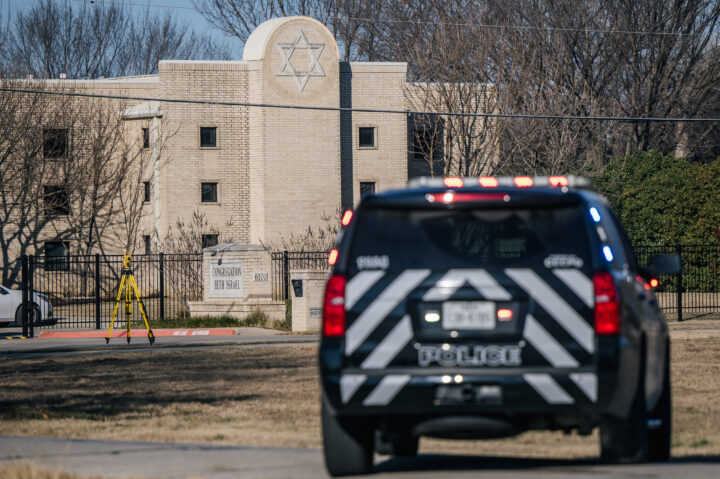
Brandon Bell/Getty Images
A law enforcement vehicle sits near the Congregation Beth Israel synagogue on January 16, 2022 in Colleyville, Texas.
The House Appropriations Committee voted on Tuesday to boost its proposal for 2026 Nonprofit Security Grant Program funding by $30 million, up to $335 million, an increase that Jewish groups say is a positive, but insufficient step, amid rising threats to the community.
The change was approved by a voice vote as part of a bipartisan package of amendments.
The committee’s original proposal had set funding for the program at $305 million, the same funding level in place in 2023, which had fulfilled less than half of the grant applications received at the time, before the spike in domestic antisemitism and antisemitic violence in the aftermath of the Oct. 7, 2023, Hamas terror attacks and ensuing war in Gaza.
Supporters of the program on Capitol Hill have, on a bipartisan basis, called for $500 million to be provided for the program in 2026, while many Jewish community groups have said the program should receive $1 billion.
The debate also comes amid rising fears of Iranian-backed or Iran-inspired attacks on Jewish institutions in the U.S. prompted by Israeli and American strikes on Iran.
Eric Fingerhut, the CEO of the Jewish Federations of North America, told Jewish Insider that JFNA is “grateful” for the funding boost, which is “a meaningful step forward, but it’s still not enough.”
“Security isn’t a luxury — it’s a necessity. For many Jewish organizations, the cost of keeping their doors open and our community safe from growing antisemitic threats is the single largest cost,” Fingerhut said.
He noted that JFNA and other Jewish groups are bringing a delegation of more than 400 Jewish leaders to Congress on Wednesday to advocate for greater NSGP funding and other priorities.
Lauren Wolman, director of federal policy and strategy at the Anti-Defamation League, said, “In the wake of surging antisemitic violence and the heightened threat environment following the Iran-Israel conflict, Jewish communities across the country are living in fear.”
“ADL was proud to work with bipartisan members to increase funding for the Nonprofit Security Grant Program in the Homeland Security Appropriations Markup,” Wolman said. “In times of crises, expressions of solidarity are important, but they must be backed by meaningful action. As the appropriations process moves forward, ADL will continue working with members of Congress on both sides of the aisle to increase funding to ensure at-risk communities can worship, learn, and gather without fear.”
“This funding boost over the Subcommittee’s initial proposal is a very welcome and good start,” Nathan Diament, executive director of the Orthodox Union Advocacy Center, said in a statement. “We appreciate the Appropriations Committee’s bipartisan effort to increase funding for the NSGP at such a critical time. With threats against the Jewish community surging, every additional dollar makes a difference in protecting lives.”
But, Diament continued, “the need far exceeds current funding levels, and we will continue to work with allies in Congress toward the $500 million funding target. That level of funding is what our community needs, and it is supported by a strong bipartisan coalition.”
The OU’s Nathan Diament said, ‘Thoughts and prayers are not going to protect us. It’s time for Congress to step up with the resources needed to keep our communities safe’

Brandon Bell/Getty Images
A law enforcement vehicle sits near the Congregation Beth Israel synagogue on January 16, 2022 in Colleyville, Texas.
Jewish groups said on Monday that the House Appropriations Committee’s 2026 appropriations bill, which includes $305 million in funding for the Federal Emergency Management Agency’s Nonprofit Security Grant Program, fails to meet the need for the program.
The House Appropriations subcommittee on Homeland Security voted on Monday evening to advance the bill funding the Department of Homeland Security, which oversees FEMA, with an increase from 2025 of just over $30 million for NSGP funding. The full committee will debate and vote on the bill on Thursday morning.
Nathan Diament, the executive director of the Orthodox Union Advocacy Center, said in a statement the House proposal is “a far cry from what is needed in the face of exploding antisemitism.”
“The pro-Hamas calls to ‘globalize the Intifada’ have arrived in America. Jewish communities are facing a real crisis with a real set of threats, and Congress must respond with real action,” Diament said.
“Every synagogue, school, and community center denied funding is left vulnerable. Thoughts and prayers are not going to protect us. It’s time for Congress to step up with the resources needed to keep our communities safe,” he continued.
The Anti-Defamation League expressed a similar view.
“In the wake of the horrific antisemitic violence we’ve seen in Washington, D.C., and Boulder, our communities are living in fear. We appreciate the proposed increase to $305 million for the Nonprofit Security Grant Program, but it is not enough,” Lauren Wolman, director of federal policy and strategy at the ADL, said in a separate statement. “Not when Jewish schools are forced to hire armed guards. Not when synagogues are receiving bomb threats during services.”
Wolman continued, “This program is a lifeline, and the demand far exceeds what this funding level can provide. ADL is committed to working with bipartisan lawmakers to ensure more at-risk communities have the resources they need to feel safe. Words of support must be matched with action.”
The $305 million figure would restore the program to its 2023 funding levels, though it still falls short of what Jewish advocacy groups and lawmakers have called for. At the time, the $305 million funding level fell short of meeting demand.
OU Advocacy, the public policy arm of the Orthodox Union, is one of many Jewish organizations that has called for at least $500 million in NSGP funding for the next fiscal year.
Both the OU and the ADL signed onto a joint statement with other Jewish community groups following the Capital Jewish Museum shooting last month, urging federal officials to increase NSGP funding to $1 billion.
“OU Advocacy views the NSGP as severely underfunded, despite skyrocketing antisemitism. In 2023, the program received 5,257 applications for $679 million in funding, but only 42% were approved. In 2024, more than 7,500 organizations applied for nearly $1 billion in grants, but less than half, $454.5 million, was distributed,” the organization’s press release stated.
The Trump administration has requested $274.5 million for NSGP for FY 2026, keeping the program funded at FY 2025 levels.
Senate Minority Leader Chuck Schumer (D-NY) held a press conference with other New York Democratic lawmakers, including Sen. Kirsten Gillibrand (D-NY) and Reps. Jerry Nadler (D-NY) and Dan Goldman (D-NY), as well as communal Jewish leaders to push for $500 million for the program. He said that Republicans on the Senate Appropriations Committee, who will release their own draft bill, “seemed open to it.”
Plus, the surprise hotspot in NYC's West Village

LUDOVIC MARIN/AFP via Getty Images
French President Emmanuel Macron (R) shakes hands with Palestinian President Mahmud Abbas during a meeting on the sidelines of the 79th Session of the United Nations General Assembly in New York on September 25, 2024.
Good Monday morning.
In today’s Daily Kickoff, we report on the House Appropriations Committee’s suggested 2026 funding for the Nonprofit Security Grant Program, amid a warning from federal agencies of an “elevated threat” facing the Jewish community. We look at the state of relations between Israel and France as Paris moves toward unilaterally recognizing a Palestinian state, and report on UCSF’s firing of a medical school professor accused of antisemitism. Also in today’s Daily Kickoff: Vice President JD Vance, Sen. John Hickenlooper and Rep. Brad Sherman.
What We’re Watching
- The House of Representatives is set to vote this evening on two resolutions condemning antisemitism and the terrorist attack on a hostage march in Boulder, Colo. One resolution from Republicans, focused on Boulder, highlights immigration issues and denounces the slogan “Free Palestine,” while the other, which is bipartisan, links Sunday’s Colorado attack to a series of other recent violent antisemitic attacks. The first of the two is already attracting criticism from Democrats.
- The House Appropriations Committee’s Homeland Security subcommittee will hold a vote on its 2026 funding bill today. More below.
- New York City Mayor Eric Adams is holding a roundtable for Jewish media this morning.
- The Jewish Federations of North America is leading an LGBTQ+ Pride mission to Israel this week.
What You Should Know
A QUICK WORD WITH MELISSA WEISS
The image of Greta Thunberg eyeing a turkey sandwich as she is taken into Israeli custody has been picked up across pro-Israel social media. And on the other side of the ideological spectrum, supporters of Thunberg, who is vegan, decried the “hostage-taking” of the Swedish climate activist and other participants on the boat that had been headed to Gaza before its interception overnight by Israel’s navy.
But the stunt — after all, the small vessel carrying Thunberg and the other activists could carry only a minimal amount of aid — has briefly taken global attention away from the legitimate efforts to distribute aid in Gaza, amid mounting distribution challenges following the launch of the Gaza Humanitarian Foundation last month.
Distribution through the GHF was briefly paused last week following a series of incidents in and around distribution sites, including the shooting of some Gazans as they neared sites as instructed, and the rush on other facilities by crowds of Gazans. Additionally, the GHF said it was forced to close its distribution sites on Saturday due to threats from Hamas.
ON ALERT
FBI, Jewish security experts warn of uptick in antisemitic threats

The American Jewish community is facing an “elevated threat” following a surge of violent antisemitic attacks across the country in recent weeks, the FBI and Department of Homeland Security warned last week. In a joint statement, the FBI and DHS called for increased vigilance among Jewish communities, noting the possibility of copycat attacks after a shooting in Washington in which two Israeli Embassy employees were killed and an attack in Boulder, Colo., in which 15 people were injured in a firebombing targeting advocates calling for the release of hostages in Gaza, Jewish Insider’s Haley Cohen reports.
Words of warning: “The ongoing Israel-HAMAS conflict may motivate other violent extremists and hate crime perpetrators with similar grievances to conduct violence against Jewish and Israeli communities and their supporters. Foreign terrorist organizations also may try to exploit narratives related to the conflict to inspire attacks in the United States,” the agencies warned. Jewish organizations that track threats to the community are similarly concerned about online rhetoric following the attacks. The Anti-Defamation League highlighted that, one day after the incident in Boulder, videos allegedly recorded by the assailant shortly before the assault began circulated on a Telegram channel called Taufan al-Ummah, which translates to “Flood of the Ummah,” a reference to the Al-Aqsa Flood, Hamas’ name for its October 7 terror attack on Israel. The circulated posts celebrated the actions of the terror suspect, Mohamed Sabry Soliman.




